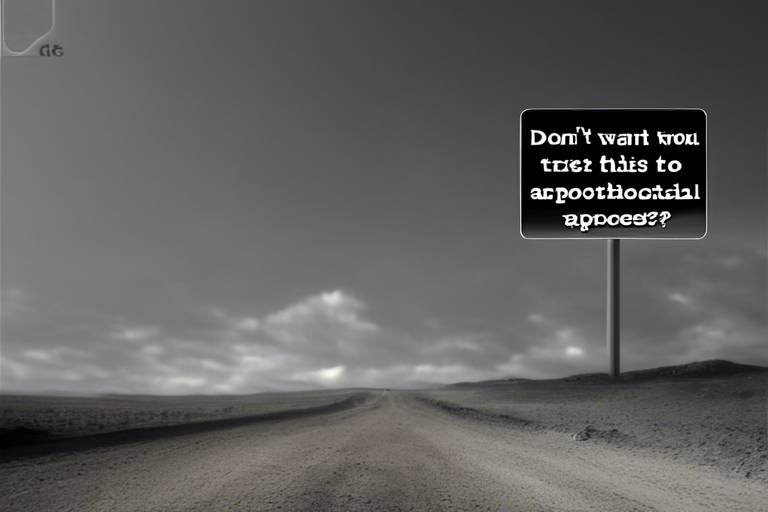An Overview of Cartesian Dualism
Cartesian dualism is a fascinating philosophical concept that has sparked intense debate and inquiry since its inception. At its core, this theory posits a profound distinction between the mind and the body, suggesting that they are fundamentally different entities. But what does that really mean? Imagine your mind as a pilot navigating a ship (your body) through the vast ocean of existence. The pilot and the ship, while intimately connected, operate in distinctly different realms. This analogy captures the essence of Cartesian dualism, which was famously articulated by the 17th-century philosopher René Descartes.
In this article, we will explore the historical context that gave rise to Cartesian dualism, delve into its key principles, and examine its implications for our understanding of the mind-body relationship. Furthermore, we will discuss the critiques it faces in modern philosophical discourse and its lasting influence on various fields, including psychology and neuroscience. By the end of this journey, you will have a clearer understanding of how this dualistic perspective continues to shape our understanding of consciousness and existence.
To fully appreciate Cartesian dualism, it's essential to recognize the intellectual climate of the 17th century. This was a time marked by significant scientific advancements and a growing interest in the nature of reality. Descartes, often referred to as the father of modern philosophy, sought to establish a foundation for knowledge that was free from doubt. His famous declaration, "Cogito, ergo sum" (I think, therefore I am), encapsulates his belief in the primacy of the mind. This assertion laid the groundwork for his dualistic view, where the mind is seen as a non-material substance distinct from the physical body.
As we navigate through the intricacies of Cartesian dualism, we will uncover how this perspective has not only influenced philosophical thought but has also permeated various domains of inquiry. From the realms of psychology, where the mind's workings are scrutinized, to neuroscience, which seeks to unravel the mysteries of brain function, the mind-body distinction remains a pivotal topic. It raises intriguing questions about the essence of consciousness, identity, and the nature of reality itself.
In summary, Cartesian dualism offers a compelling framework for understanding the complex relationship between the mind and body. Its historical roots, foundational principles, and ongoing relevance in contemporary discussions make it a crucial topic for anyone interested in the philosophy of mind. So, buckle up as we dive deeper into this thought-provoking subject!
- What is Cartesian dualism? Cartesian dualism is the philosophical idea that the mind and body are distinct entities, with the mind being a non-material substance and the body a material one.
- Who proposed Cartesian dualism? The concept was proposed by the French philosopher René Descartes in the 17th century.
- How does Cartesian dualism relate to modern science? Cartesian dualism has influenced various fields, including psychology and neuroscience, by framing the ongoing debate about the nature of consciousness and the mind-body relationship.
- What are the critiques of Cartesian dualism? Critics argue against Cartesian dualism from perspectives like physicalism and monism, claiming that a dualistic framework fails to adequately explain consciousness and existence.

Historical Context of Cartesian Dualism
The concept of Cartesian dualism, named after the renowned philosopher René Descartes, emerged during a pivotal period in the history of philosophy—the 17th century. This era was characterized by a significant shift in intellectual thought, often referred to as the Renaissance, which emphasized human reason and scientific inquiry. Descartes, often hailed as the father of modern philosophy, sought to reconcile the emerging scientific discoveries with the philosophical questions surrounding the nature of existence, knowledge, and reality.
Born in 1596 in France, Descartes lived through a time of remarkable change. The scientific revolution was in full swing, with figures like Galileo Galilei and Isaac Newton challenging traditional views of the universe. Descartes was influenced by this burgeoning scientific landscape, which encouraged a more empirical approach to understanding the world. However, he was also deeply concerned with the implications of these scientific advancements on human consciousness and identity.
In his seminal work, Meditations on First Philosophy, Descartes famously declared, “I think, therefore I am.” This statement encapsulates his belief in the primacy of the mind as a distinct entity, separate from the physical body. He argued that the mind is a non-material substance, capable of independent thought and reflection, while the body is a material substance governed by physical laws. This dualistic view set the stage for a profound philosophical inquiry into the relationship between mind and body.
To further understand the historical context of Cartesian dualism, it's essential to recognize the philosophical backdrop against which Descartes was writing. The Scholasticism of the Middle Ages, which dominated European thought, emphasized a synthesis of Christian theology and Aristotelian philosophy. However, as the Renaissance progressed, thinkers began to question these established doctrines, leading to a rise in rationalism and empiricism. Descartes, with his method of doubt and emphasis on reason, became a central figure in this intellectual revolution.
Moreover, the interplay between science and philosophy during Descartes' time cannot be overstated. The development of the scientific method encouraged a more systematic approach to knowledge, which included the examination of the self and consciousness. This inquiry into the nature of the mind and its relationship to the body was not merely an abstract philosophical exercise; it had real implications for understanding human behavior, ethics, and even the nature of reality itself.
In summary, the historical context of Cartesian dualism is rooted in a transformative period where science and philosophy began to diverge from traditional beliefs. Descartes’ innovative ideas about the mind-body relationship not only challenged existing paradigms but also laid the groundwork for future philosophical debates. His work continues to resonate in contemporary discussions about consciousness and identity, reminding us of the enduring quest to understand the complexities of human existence.

Key Principles of Cartesian Dualism
At the heart of Cartesian dualism lies a profound distinction between two fundamental entities: the mind and the body. This philosophical framework, championed by the 17th-century thinker René Descartes, posits that the mind is a non-material entity, often described as a realm of thoughts, feelings, and consciousness, while the body is viewed as a tangible, material substance that occupies space and is subject to physical laws. This separation raises intriguing questions about our existence and how we perceive the world around us.
One of the key principles of Cartesian dualism is the mind-body distinction, which asserts that the mind and body operate in fundamentally different ways. Imagine a computer: the hardware represents the body, while the software embodies the mind. Just as the software dictates how the hardware functions, the mind influences the body, yet they remain distinct. This analogy helps illustrate the dualistic perspective, emphasizing that while they interact, they are not the same entity.
The implications of this mind-body distinction are vast and have sparked debates across various fields, including psychology, neuroscience, and metaphysics. For instance, in psychology, this separation has led to different schools of thought regarding the nature of consciousness and behavior. Some psychologists argue that understanding the mind requires a focus on mental processes, while others emphasize the importance of physical states and brain functions.
Another crucial aspect of Cartesian dualism is substance dualism. This principle posits that the mind and body are not only distinct but are also composed of different substances. The mind is seen as an immaterial substance, while the body is a material one. This distinction leads to significant philosophical debates about consciousness and identity. For example, if the mind is non-material, how can it affect the physical body? This question has puzzled philosophers for centuries and continues to be a focal point of discussion in contemporary philosophy.
Adding another layer to this discussion is the concept of interactionism, which suggests that the mind and body can influence each other. This raises profound questions about causation: how can a non-material mind exert influence over a material body? To illustrate this, consider the experience of feeling anxious (a mental state) that can lead to physical symptoms such as a racing heart or sweating. This interaction challenges us to consider the nature of causality and how these two distinct substances communicate.
In summary, the key principles of Cartesian dualism revolve around the intricate relationship between the mind and body, emphasizing their distinct natures while acknowledging their capacity for interaction. This framework not only provides a foundation for understanding consciousness but also invites ongoing exploration into the mysteries of human existence.
- What is Cartesian dualism? Cartesian dualism is a philosophical concept that distinguishes between the mind as a non-material entity and the body as a material substance.
- Who proposed Cartesian dualism? The concept was developed by the French philosopher René Descartes in the 17th century.
- What are the implications of Cartesian dualism? It influences various fields, including psychology and neuroscience, and raises questions about consciousness and identity.
- What is the difference between substance dualism and interactionism? Substance dualism posits that the mind and body are different substances, while interactionism suggests that they can affect one another.

Mind-Body Distinction
The concept of is at the very heart of Cartesian dualism, presenting a fascinating yet complex view of human existence. Imagine for a moment that your mind is like a pilot steering a ship, while your body represents the vessel navigating through the vast ocean of life. This vivid analogy underscores the fundamental idea that the mind and body are not merely different aspects of the same entity, but rather two distinct substances that interact in profound ways. Descartes famously stated, “I think, therefore I am,” emphasizing the primacy of thought as the defining characteristic of existence. This assertion invites us to ponder: if our thoughts are separate from our physical form, what does that mean for our understanding of reality?
To dive deeper into this distinction, we can consider the implications it has for various fields. In psychology, for instance, the separation of mind and body has led to diverse theories about mental processes and behaviors. Some psychologists argue that mental states can exist independently of physical states, suggesting that our emotions, thoughts, and consciousness are not confined to our brain's neural activity. This perspective has given rise to therapeutic practices that focus on the mind's influence over the body, such as cognitive-behavioral therapy, which highlights the power of thought in shaping our physical well-being.
Moreover, in the realm of neuroscience, the mind-body distinction raises intriguing questions. Researchers are continually exploring how the brain—a physical organ—can give rise to subjective experiences like thoughts and feelings. This inquiry is often framed within the context of the mind-body problem, which seeks to understand how two seemingly different substances can interact. For example, how does an emotion like fear, which is a mental state, trigger a physical response such as an increased heart rate? This intersection of mind and body remains a hotbed of research and debate.
Furthermore, the philosophical implications of this distinction extend into metaphysics and the nature of consciousness itself. If we accept that the mind and body are separate, we must grapple with questions about identity and existence. For instance, what happens to the mind after death? Is it immortal, or does it cease to exist when the body does? Such inquiries have fueled countless discussions among philosophers and scientists alike, highlighting the enduring relevance of Cartesian dualism in contemporary thought.
In summary, the mind-body distinction is more than just a theoretical framework; it is a lens through which we can examine our existence and the nature of reality itself. By understanding this separation, we open ourselves up to a world of possibilities regarding consciousness, identity, and the intricate dance between our mental and physical selves.
- What is Cartesian dualism? Cartesian dualism is a philosophical concept proposed by René Descartes that posits the mind and body as two distinct substances that interact with each other.
- How does the mind-body distinction affect psychology? The mind-body distinction influences various psychological theories, particularly those that emphasize the role of thought and emotion in affecting physical health and behavior.
- What are the implications of the mind-body problem? The mind-body problem raises questions about how mental states can arise from physical processes, leading to ongoing debates in philosophy, neuroscience, and psychology.
- Can the mind exist without the body? This question is central to discussions of consciousness and identity, with differing views among philosophers and scientists regarding the nature of existence after death.

Substance Dualism Explained
Substance dualism is a fascinating philosophical concept that stems from the ideas of René Descartes, who famously declared, “I think, therefore I am.” This notion posits that the mind and body are two fundamentally different substances. To put it simply, think of the mind as a non-material essence, while the body is a material entity. This separation raises profound questions about the nature of consciousness, identity, and what it means to be human.
At the heart of substance dualism is the idea that mental phenomena are, in some way, distinct from physical processes. Imagine trying to explain a vivid dream to someone who has never experienced one. You might describe the colors, the emotions, and the sensations, but how can you convey the essence of that experience? This is the crux of the dualistic argument: mental experiences, like dreams or thoughts, seem to exist in a realm separate from our physical bodies.
To better understand substance dualism, let’s break down its key components:
- Mind as a Non-Material Substance: According to substance dualists, the mind exists independently of the body. It is not bound by the laws of physics, which means it can exist even when the body ceases to function.
- Body as a Material Substance: The body, in contrast, is subject to physical laws. It can be observed, measured, and studied scientifically. This is where many debates arise, as the mind's non-material nature challenges our understanding of physical reality.
This dualistic view has led to significant philosophical debates about consciousness and identity. For instance, if the mind and body are separate, what happens to the mind after death? Does it continue to exist independently? These questions have perplexed philosophers for centuries and have spurred countless arguments both for and against the dualistic framework.
Moreover, substance dualism has implications beyond philosophy; it has significantly influenced fields such as psychology and neuroscience. For example, the idea that mental states can affect physical states (and vice versa) creates a rich ground for exploring how we understand mental health. If our thoughts can influence our physical well-being, then therapies that address mental states could have profound effects on physical health outcomes.
In summary, substance dualism presents a compelling yet contentious view of the mind-body relationship. It challenges us to reconsider our understanding of consciousness and existence itself. As we continue to explore the depths of this philosophical concept, we must also grapple with its implications in modern science and our daily lives.

Interactionism in Dualism
Interactionism is a fascinating aspect of Cartesian dualism that raises profound questions about the relationship between the mind and body. At its core, interactionism posits that the mind and body are not just separate entities; they actively influence each other. Imagine a dance between two partners, where each movement affects the other, creating a dynamic interplay that shapes the overall performance. This analogy beautifully captures the essence of interactionism, where mental states can lead to physical actions and vice versa.
René Descartes, the father of Cartesian dualism, argued that the mind, as a non-material substance, could interact with the body, a material substance, through the pineal gland. This small gland located deep within the brain was thought to be the point of connection between these two realms. While modern neuroscience has largely debunked this specific claim, the underlying idea that the mind can affect the body remains a critical topic of discussion. For instance, consider how emotions can lead to physical reactions—think of the last time you felt nervous and your heart raced. This is a clear illustration of how mental states can manifest in physical ways.
Furthermore, interactionism raises intriguing questions about causation. If the mind can influence bodily functions, does that mean our thoughts hold power over our physical reality? This notion has significant implications for fields such as psychology and medicine. For example, the placebo effect demonstrates how belief and expectation can lead to real physiological changes, showcasing the mind's ability to impact the body. Similarly, practices like mindfulness and meditation highlight the mind's potential to promote healing and well-being.
However, the interactionist view is not without its challenges. Critics argue that if the mind and body are fundamentally different substances, how can they interact without violating the laws of physics? This dilemma leads to complex debates about the nature of causation and the mechanisms through which this interaction occurs. Some philosophers propose that perhaps the mind and body do not interact in a straightforward manner but rather through more intricate processes that we have yet to fully understand.
In conclusion, interactionism within Cartesian dualism offers a captivating lens through which to explore the mind-body relationship. It invites us to consider the profound ways in which our thoughts and feelings can shape our physical experiences. As we continue to delve into the mysteries of consciousness, the interplay between the mind and body remains a rich field of inquiry, promising to unveil new insights into the very nature of our existence.
- What is interactionism in Cartesian dualism? Interactionism is the idea that the mind and body can influence each other, suggesting an active relationship between mental and physical states.
- How did Descartes explain the interaction between mind and body? Descartes proposed that the pineal gland served as the point of interaction between the non-material mind and the material body.
- What are some examples of interactionism in everyday life? Emotional responses, such as feeling anxious leading to a racing heart, or the placebo effect, which shows how belief can cause real physical changes, are examples of interactionism.
- What challenges does interactionism face? Critics question how two fundamentally different substances can interact without violating physical laws, leading to ongoing debates in philosophy and science.

Critiques of Cartesian Dualism
Cartesian dualism, while revolutionary in its time, has faced significant scrutiny from various philosophical perspectives. Critics argue that the separation of mind and body is not only overly simplistic but also fundamentally flawed. One of the most prominent challenges comes from the perspective of physicalism, which posits that everything about the mind can be explained in terms of physical processes. This view suggests that mental states are merely byproducts of brain activity, thus undermining the dualistic notion that the mind exists independently of the body.
Another major critique stems from monism, which argues for a unified view of existence. Monists contend that the mind and body are not distinct entities but rather different aspects of the same reality. This perspective aligns with contemporary scientific understanding, which increasingly favors a holistic approach to studying consciousness. By viewing the mind as an emergent property of complex physical systems, monism challenges the necessity of a dualistic framework.
Furthermore, the concept of interactionism within Cartesian dualism raises perplexing questions about causation. If the mind and body are fundamentally different substances, how can they interact? This dilemma is often referred to as the interaction problem. Critics argue that if the mind can influence physical states (like deciding to move your arm), it raises questions about how this influence occurs without violating the laws of physics. This has led to the development of alternative theories that attempt to explain the mind-body relationship without resorting to dualism.
To illustrate some of these critiques, consider the following table summarizing key arguments against Cartesian dualism:
| Critique | Description |
|---|---|
| Physicalism | All mental states can be explained through physical processes in the brain. |
| Monism | The mind and body are not separate entities but different aspects of the same reality. |
| Interaction Problem | Questions how two fundamentally different substances can interact without violating physical laws. |
In addition to these philosophical critiques, advancements in neuroscience have also posed challenges to Cartesian dualism. As scientists delve deeper into the workings of the brain, they increasingly find correlations between brain activity and mental states. This growing body of evidence suggests that rather than being separate, the mind and body are intricately linked, further questioning the validity of a dualistic approach.
In conclusion, while Cartesian dualism has played a significant role in shaping our understanding of the mind-body relationship, its critiques highlight the need for a more integrated perspective. As we continue to explore consciousness and its complexities, it becomes clear that a dualistic framework may not adequately capture the nuances of human experience.
- What is Cartesian dualism? Cartesian dualism is a philosophical concept proposed by René Descartes, which posits that the mind and body are distinct entities that interact with each other.
- What are the main critiques of Cartesian dualism? Major critiques include arguments from physicalism, which suggests that mental states are purely physical, and monism, which argues that mind and body are not separate entities.
- How does neuroscience challenge Cartesian dualism? Neuroscience demonstrates a strong correlation between brain activity and mental states, suggesting that the mind and body are more interconnected than dualism implies.

Cartesian Dualism's Influence on Modern Philosophy
Cartesian dualism, introduced by the French philosopher René Descartes in the 17th century, has left an indelible mark on the landscape of modern philosophy. Its profound implications on the understanding of the mind-body relationship have spurred countless debates and discussions that continue to resonate today. Descartes’ assertion that the mind and body are distinct entities has not only influenced philosophical thought but has also shaped various fields including psychology, neuroscience, and even ethics.
One of the most significant impacts of Cartesian dualism is its role in the development of existentialism and phenomenology. Thinkers like Sartre and Heidegger grappled with the implications of dualism, exploring the nature of existence and consciousness. They questioned how a non-material mind could interact with a material body, leading to rich discussions about human freedom, identity, and the essence of being. This philosophical inquiry set the stage for a deeper exploration of subjective experience, where the mind's unique perspectives were acknowledged as crucial to understanding human behavior.
Moreover, Cartesian dualism has been a catalyst for modern debates surrounding cognitive science. The challenge of reconciling the mind's qualitative experiences with the quantitative approaches of neuroscience has led to a burgeoning field that seeks to bridge the gap between mind and body. Scholars and scientists are now investigating how mental states can influence physical processes, and vice versa, which echoes Descartes' notion of interactionism. This ongoing dialogue highlights the relevance of dualism in contemporary discussions about consciousness and identity.
Interestingly, the influence of Cartesian dualism extends beyond philosophy and psychology. It has also permeated discussions in ethics, particularly in the realm of moral philosophy. The distinction between mind and body raises ethical questions about the treatment of individuals with mental illnesses or cognitive impairments. If the mind is viewed as separate from the physical body, what does that mean for our understanding of moral responsibility and agency? Such questions continue to challenge our societal norms and ethical frameworks.
To encapsulate the multifaceted influence of Cartesian dualism on modern philosophy, consider the following table that outlines its key contributions across various fields:
| Field | Impact of Cartesian Dualism |
|---|---|
| Philosophy | Influenced existentialism and phenomenology; raised questions about existence and consciousness. |
| Psychology | Shaped theories of mind and behavior; implications for mental health and treatment. |
| Neuroscience | Informed research on consciousness and the mind-body problem; ongoing debates about brain function. |
| Ethics | Challenged moral responsibility and agency; influenced perspectives on mental illness. |
In summary, Cartesian dualism has profoundly influenced modern philosophical discourse, prompting ongoing inquiries into the nature of consciousness, existence, and the intricate relationship between mind and body. As we continue to explore these complexities, it is evident that Descartes' legacy remains a vital part of our understanding of what it means to be human.
- What is Cartesian dualism? Cartesian dualism is a philosophical concept that posits the mind and body as two distinct entities that interact with each other.
- How has Cartesian dualism influenced modern philosophy? It has shaped discussions in existentialism, phenomenology, and cognitive science, as well as ethical considerations regarding moral responsibility.
- What are the criticisms of Cartesian dualism? Critics argue that dualism fails to adequately explain the relationship between mental and physical states, often favoring physicalism or monism.
- Is Cartesian dualism relevant today? Yes, its implications continue to inform contemporary debates in philosophy, psychology, neuroscience, and ethics.

Legacy in Psychology
The legacy of Cartesian dualism in psychology is profound and multifaceted, influencing how we understand the intricate relationship between the mind and behavior. At its core, Cartesian dualism posits a distinct separation between the mind, often associated with thoughts and emotions, and the body, linked to physical actions and biological processes. This separation has led to significant developments in psychological theories, particularly in how mental health and illness are conceptualized.
One of the most notable impacts of Cartesian dualism is the emergence of various psychological schools of thought that emphasize the importance of the mind as an independent entity. For instance, cognitive psychology focuses on internal mental processes such as perception, memory, and problem-solving, highlighting the mind's role in shaping behavior. This approach aligns with Descartes' view that the mind operates separately from the physical body, challenging earlier behavioral theories that primarily focused on observable actions.
Additionally, the dualistic perspective has paved the way for the development of therapeutic practices that address mental health issues through a lens that separates psychological and physiological factors. For example, many therapeutic approaches, such as cognitive-behavioral therapy (CBT), operate on the premise that changing thought patterns can lead to changes in behavior and emotional well-being. This reflects a Cartesian influence where the mind is seen as capable of influencing the body, and vice versa.
However, the legacy of Cartesian dualism is not without its critiques. Some psychologists argue that this separation can lead to a fragmented understanding of human experience. For instance, the rise of holistic approaches in psychology, such as humanistic psychology, emphasizes the interconnectedness of mind and body, suggesting that to truly understand a person, one must consider both aspects as part of a unified whole. This perspective challenges the dualistic view and calls for a more integrated approach to psychological health.
Moreover, the ongoing debates in psychology about the nature of consciousness and identity reflect the enduring influence of Cartesian dualism. Researchers are continually exploring questions such as: What is consciousness? How does it relate to brain function? These inquiries are reminiscent of Descartes' original musings, showcasing how his ideas continue to provoke thought and discussion in contemporary psychology.
In summary, the legacy of Cartesian dualism in psychology is significant, shaping various theories and practices while also sparking critical discussions about the nature of the mind-body relationship. As we continue to explore the complexities of human behavior and mental health, the dualistic framework remains a crucial reference point, reminding us that our understanding of the mind and body is still evolving.
- What is Cartesian dualism?
Cartesian dualism is a philosophical concept that posits a distinction between the mind as a non-material entity and the body as a material substance, suggesting that they interact but are fundamentally different. - How has Cartesian dualism influenced psychology?
It has shaped various psychological theories, emphasizing the separation of mental processes from physical actions, and has led to the development of therapeutic practices that address mental health through cognitive approaches. - Are there critiques of Cartesian dualism in psychology?
Yes, some psychologists argue that the dualistic perspective can lead to a fragmented understanding of human experience, advocating for more holistic approaches that consider the mind and body as interconnected.

Impact on Neuroscience
The impact of Cartesian dualism on neuroscience is both profound and complex. At its core, Cartesian dualism posits a clear division between the mind and body, suggesting that mental phenomena are non-physical and exist independently of the brain. This perspective has sparked a plethora of debates within the scientific community, particularly regarding how consciousness arises and how it interacts with the physical processes of the brain.
One of the most significant challenges that Cartesian dualism presents to neuroscience is the mind-body problem. This issue questions how two fundamentally different substances—mental and physical—can interact. For instance, how can a thought (a non-material entity) cause a physical action, like moving your hand? Neuroscience strives to bridge this gap by investigating the neural correlates of consciousness and understanding how brain activity relates to mental states.
Modern neuroscience often leans towards a more physicalist view, which asserts that everything about the mind can be explained in terms of brain activity. This viewpoint is at odds with Cartesian dualism, leading to ongoing debates about the nature of consciousness. Researchers are increasingly using advanced imaging techniques, such as fMRI and EEG, to explore the brain's structure and function, hoping to uncover the biological underpinnings of mental experiences. These studies often reveal correlations between specific brain regions and particular cognitive functions, suggesting that our thoughts, feelings, and behaviors may be deeply rooted in our neurological architecture.
However, the question remains: can neuroscience fully explain consciousness? Some neuroscientists argue that while we can identify brain processes associated with thoughts and feelings, the subjective experience of consciousness—often referred to as qualia—eludes a purely physical explanation. This dilemma invites further inquiry into the philosophical implications of consciousness and whether a dualistic framework might still hold relevance in understanding human experience.
In light of these discussions, it’s crucial to recognize that the dialogue between neuroscience and Cartesian dualism is ongoing. The following table outlines some key areas where this interaction is most evident:
| Aspect | Cartesian Dualism Perspective | Neuroscience Perspective |
|---|---|---|
| Consciousness | Non-physical, separate from the brain | Emerges from brain activity |
| Mind-Body Interaction | Distinct entities influencing each other | Brain processes cause mental states |
| Qualia | Subjective experiences are fundamental | Correlates with neural activity, but not fully explained |
Furthermore, the influence of Cartesian dualism can also be seen in the way mental health issues are approached within neuroscience. Traditionally, many psychological disorders were viewed through a dualistic lens, where emotional and psychological problems were seen as separate from the physical body. However, as neuroscience has evolved, there is a growing recognition of the biopsychosocial model, which combines biological, psychological, and social factors in understanding mental health. This shift reflects a more integrated approach, moving away from strict dualism while still acknowledging the complex interplay between mind and body.
In conclusion, the impact of Cartesian dualism on neuroscience is significant, shaping how we understand the mind-body relationship. While the dualistic framework presents challenges, it also opens the door for rich discussions about consciousness, identity, and the nature of reality. As neuroscience continues to advance, it remains crucial to engage with these philosophical questions, ensuring that our understanding of the mind is as comprehensive as possible.
- What is Cartesian dualism? Cartesian dualism is a philosophical concept introduced by René Descartes that posits a distinction between the mind (non-material) and the body (material).
- How does Cartesian dualism affect modern neuroscience? It raises questions about the nature of consciousness and challenges researchers to explore the relationship between mental states and brain activity.
- What are the criticisms of Cartesian dualism? Critics argue that it fails to adequately explain how the mind and body interact and that a physicalist approach may offer a more comprehensive understanding of consciousness.
Frequently Asked Questions
- What is Cartesian dualism?
Cartesian dualism is a philosophical concept proposed by René Descartes that posits a fundamental distinction between the mind and the body. It suggests that the mind is a non-material entity, while the body is a physical substance, leading to significant discussions about their interaction and relationship.
- Who was René Descartes?
René Descartes was a 17th-century French philosopher, mathematician, and scientist, often referred to as the father of modern philosophy. His work laid the groundwork for many contemporary philosophical discussions, particularly regarding the nature of existence and the mind-body relationship.
- What are the key principles of Cartesian dualism?
The key principles include the distinction between the mind and body as separate substances, the concept of substance dualism, and interactionism, which suggests that while the mind and body are distinct, they can still influence one another.
- How does Cartesian dualism influence modern philosophy?
Cartesian dualism has significantly shaped contemporary philosophical discourse, impacting fields like existentialism, phenomenology, and cognitive science. It raises ongoing debates about consciousness, identity, and the nature of reality.
- What are some critiques of Cartesian dualism?
Critics argue against Cartesian dualism from perspectives like physicalism and monism, claiming it struggles to adequately explain consciousness and existence. They suggest that a dualistic framework may not fully capture the complexities of the mind-body relationship.
- What legacy does Cartesian dualism have in psychology?
In psychology, Cartesian dualism has influenced theories about the mind and behavior, shaping our understanding of mental health and illness. It highlights the complexities of mental processes and their interactions with physical states.
- How does Cartesian dualism impact neuroscience?
The mind-body problem, rooted in Cartesian dualism, continues to inform neuroscience research. It raises questions about consciousness, brain function, and how mental states relate to physical processes in the brain.



















